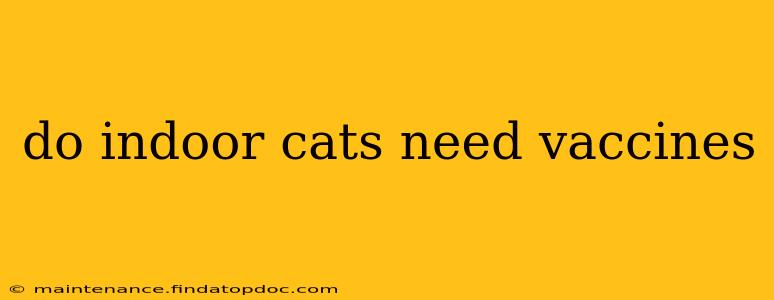Do Indoor Cats Need Vaccines? A Comprehensive Guide for Cat Owners
While many believe that indoor cats are safe from diseases and therefore don't require vaccinations, this is a misconception that can have serious consequences for your feline friend. Even strictly indoor cats are vulnerable to several diseases, and vaccination offers crucial protection. This article will explore the importance of vaccinating indoor cats, addressing common concerns and questions.
Why Vaccinate an Indoor Cat? The Risks Remain
Many infectious diseases can be transmitted in unexpected ways, even if your cat never steps outside. For instance, pathogens can be carried into your home on your clothes or shoes, or even by other animals like visiting dogs or wildlife that might access your property. While the risk might be lower than for outdoor cats, it's certainly not zero. Protecting your cat through vaccination is a proactive measure that minimizes these risks considerably.
What Diseases Can Indoor Cats Get?
Several diseases pose a significant threat to indoor cats, underscoring the importance of vaccination:
- Feline Herpesvirus (FHV-1) and Feline Calicivirus (FCV): These are highly contagious viruses causing upper respiratory infections. Symptoms can range from mild sneezing and runny nose to severe pneumonia and even death.
- Feline Panleukopenia (FPV): This deadly virus attacks the bone marrow, causing a devastating drop in white blood cells, leaving the cat vulnerable to secondary infections. It's highly resistant to environmental disinfectants, lingering for long periods.
- Rabies: Although less common in indoor cats, it remains a significant concern. Transmission can occur through a bite from an infected animal, even if that encounter is indirect (e.g., a wild animal entering your home).
What Vaccines Are Recommended for Indoor Cats?
The core vaccines generally recommended for all cats, including indoor cats, are:
- FHV-1 and FCV: These vaccines are usually given together and are critical for protecting against upper respiratory infections.
- FPV: This vaccine is essential for preventing feline panleukopenia, a potentially fatal disease.
- Rabies: Rabies vaccination is often required by law, and its importance transcends the indoor/outdoor distinction.
Your veterinarian will determine the best vaccination schedule for your cat, considering its age, health, and lifestyle.
Are there any risks associated with cat vaccines?
Like all medical interventions, vaccines carry potential risks, though they are typically minor. Some cats may experience mild side effects such as lethargy, soreness at the injection site, or a slight fever. These side effects usually resolve quickly. Severe reactions are rare. Your veterinarian will thoroughly discuss any potential risks before administering vaccines.
How often should indoor cats be vaccinated?
The frequency of vaccination varies depending on the vaccine and your cat's individual circumstances. Your veterinarian will advise you on the appropriate vaccination schedule, which may involve annual or less frequent boosters. They will factor in your cat's overall health, age, and the presence of any underlying conditions.
My cat is a kitten. When should I start vaccinations?
Kitten vaccinations typically begin around 6-8 weeks of age, with subsequent boosters at intervals recommended by your veterinarian. Early vaccination is crucial to build immunity before the kitten is exposed to potential pathogens.
Are there any alternatives to traditional vaccines?
While traditional vaccines remain the most effective and widely accepted method of protecting cats from these diseases, some newer, modified-live vaccines are becoming available. However, the decision on which vaccine to use remains a conversation between you and your veterinarian.
My cat never goes outside, so why bother with vaccines?
Even indoor cats can be exposed to infectious diseases through various indirect routes, emphasizing the need for preventive vaccination. It is a small investment that can save your cat from considerable suffering and potentially life-threatening illness.
Conclusion:
Protecting your beloved feline companion is paramount. While the perceived risks might seem lower for indoor cats, the reality is that vaccination offers invaluable protection against a range of serious and potentially fatal diseases. Consulting with your veterinarian is crucial to determine the best vaccination strategy for your individual cat, ensuring its long-term health and well-being. Don't gamble with your cat's health—vaccination is a responsible and vital aspect of pet ownership.
